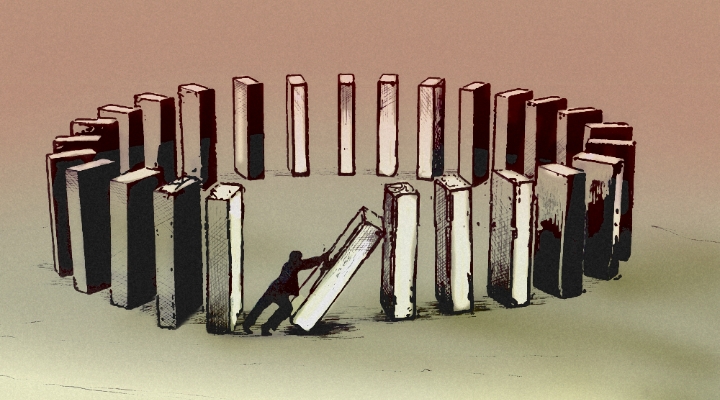:quality(80)/cloudfront-us-east-1.images.arcpublishing.com/morningstar/A6OOX7PBSVEJ5BXDFSPKGLO72M.png)
On this episode of the Morningstar podcast The Long View, author and financial educator Manisha Thakor talks financial wellness, emotional wealth, and her latest book MoneyZen: The Secret to Finding Your “Enough.”
Here are a few excerpts from Thakor’s conversation with Morningstar’s Christine Benz:
The ‘Cult of Never Enough’
Christine Benz: It’s great to have you here, and congratulations on the book. We want to talk about the book in-depth. You talk about what you call the “cult of never enough.” You have these great turns of phrases in the book. Can you describe what that cult is about?
Manisha Thakor: Absolutely. There are three ways that I think about the “cult of never enough” in terms of defining it. The first is this feeling that no matter how much money you earn, how many accomplishments you achieve, or how much praise you receive, it’s never quite enough to make you feel whole inside because the finish line keeps moving. Then the second piece that defines in my mind the “cult of never enough” is that you’ve subconsciously embraced societal messages that are telling you that the answer to virtually anything that ails you is more—do more, be more. And then, the final component of being a member of the “cult of never enough” is this feeling where no matter how many times you try and put into practice things like gratitude lists, meditating, and reading books on positive psychology, you still feel like a human doing versus a human being. And the manifestation, the outward manifestation of being stuck in the cult can be anything from extreme workaholism to extreme perfectionism. But the bottom line and the reason it’s so detrimental to our life satisfaction is that it leads to a really toxic relationship with work, money, accomplishments, and success.
What Is Enough?
Benz: That comes through loud and clear in the book. I feel like this concept of what’s enough is coming up a lot in our cultural conversation. Of course, Jack Bogle wrote a book called Enough in 2009, but it seems to be coming up even more. Do you think it’s COVID-related that people are thinking big thoughts about life and what they’re doing in the wake of COVID?
Thakor: I love that you asked that because you’re right, this phrase, “what is enough,” this question, it’s being asked, it’s just floating through the zeitgeist in so many manners. Yes, I do think COVID played a role in it because it was like a snow globe for pretty much everybody. It shook our worlds upside down. Whenever you have that kind of change, it causes you to ask questions. But I also think there’s something else going on. I recently saw a clip, I think it was on Instagram Reels, where Jim Carrey was saying, “Very few actors will say this, but I’m done. I’m not going to make any more films. Well, maybe if something truly mind-blowing comes, but I’ve got enough.” You’re seeing this with athletes who are saying, “You know what? I have accomplished a lot and I’m ready to move on to the next chapter.” So, I think it’s this combination of being forced to rethink big issues, realizing maybe what you might be missing during COVID where things were so shut down; but also there’s something else that’s going on and I can’t quite put my finger on it, but I’m seeing signs of this questioning everywhere. Maybe at the end of the day, it’s just exhaustion, sheer exhaustion from being on this 24/7 hamster wheel of hustle culture.
Did We Overcorrect Our Spending?
Benz: A follow-up question is, I feel like maybe we’ve overcorrected. There had been all this soul-searching in the depths of COVID, and people were spending a lot of time at home with their near and dearest. Now it’s like this revenge travel thing. I feel like it’s spend, spend, spend, spend. Do you sense that maybe we’re going back in the other direction and just hopping right back on that treadmill?
Thakor: I do sense that. I think the reason is that the pull is so strong and the types of things that I observed happening during COVID and the types of things that I’m seeing right now in wellness-at-work programs are really well-intentioned—gratitude lists, meditation, focusing on positive psychology, reading positive psychology books. But the issue is that those things are Band-Aids, very useful Band-Aids, but they’re not addressing the core wound, and that’s why I think we’re getting so swept back up into this business as usual at the pace of speed of life because we’re lacking a framework for thinking about and encouragement for thinking about why we’re behaving this way. And that’s really why I wrote the book.
When Is It Time for a Change?
Benz: What are the signs that it’s time for a change, that you’re on this treadmill you need to get off or at least slow it down? How can people be preemptive about that? I think sometimes people wait until there’s a health crisis, or they get divorced, or something really bad happens in their life before they start doing some soul-searching about all this.
Thakor: The clearest signals that I see are, one, you can’t mentally disconnect from work—you’re taking a hike, you’re on vacation, you are with your kids watching Frozen for the 14th time and your mind is drifting to work constantly. Another very clear one is it’s affecting your relationships, your spouse feeling like you don’t have enough time together, your kids saying, “Mommy, why are you always traveling, why can’t you be here?” Or the same thing for Daddy. And then, the one that oftentimes slams us into the wall is that we get sick. The easy answer to how to prevent it is to adopt a mindset of valuing emotional wealth.
There are some wonderful sheets you can find on the internet if you just Google “values exercise” where they list a hundred different values on a piece of paper and you circle 20 that mean something to you, and then you narrow it down to 10, and you ultimately identify like the top three or five that you want to be your North Stars guiding your activities. And when you have a sense of that, whether it’s family or self-care or community or whatever those values are, that can help you preempt.












.png)









